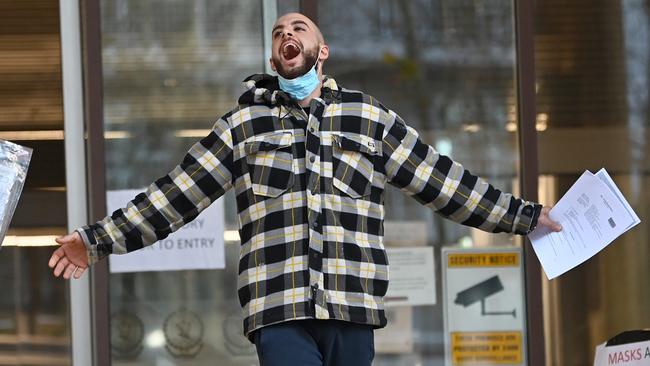Where’s the line between rights and wrongs?
Our leaders will quickly erode freedoms and rights when a sudden crisis justifies it but not when we boil slowly over time.

That may seem like a trivial change to flag as so important. Overseas, deaths and serious hospitalisations have been defining features of the pandemic. Although deaths have been nowhere near the rates experienced during the Spanish influenza pandemic from 1918 to 1920, millions have died from Covid-19, and millions more will die in underdeveloped countries.
New variants also are a medium to long-term risk for all nations, even for the vaccinated.
However, in Australia the number of deaths has been among the lowest anywhere. Notwithstanding the slowness of the vaccine rollout and the heightened risks attached to that, they are unlikely to accelerate to a point that elevates their significance when assessing the long-term impacts of Covid.
The policy levers used by governments, state and federal, to combat Covid have revealed a willingness by democratic populations to give up rights in sometimes unexpected ways. We have also seen how wide the range of powers available to governments is under the Constitution and via recent legislation. The Biosecurity Act, for example, gives government extraordinary powers.
Of course, erosions of civil liberties aren’t a new phenomenon. In the name of fighting terrorism we’ve seen an uptick in rights-stifling national security laws for years. Technological advancements and the rise of social media this century have shown people are more willing to part indiscriminately with their personal information. Indeed the cultural wont to protest or strike isn’t what it was decades ago, as new laws curtail doing either.
Long gone are the days of civil disobedience Peter Singer wrote about in the Oxford University thesis that became his first book. But the erosion of freedoms during the pandemic, and the ease with which people have accepted it, has been surprising.
An ability for premiers to ignore the federal government and lock down borders. Stay-at-home orders during lockdowns that have included evening curfews and limits on freedom of movement. Refusals by the federal government to grant entry to Australia for citizens abroad because of arrival limits. Forced quarantine for those who can successfully return home. Whole sections of the business community shut down because the services they provide are deemed “non-essential”. With the media classified as an essential services (the fourth estate and all of that), too many of us with a microphone and a pay cheque have undercooked the significance of this last point to people’s livelihoods.
Before China used lockdowns in Wuhan, democratic policymakers didn’t consider such a course of action feasible. It wasn’t part of their forward planning for a pandemic. Even then they wondered if populations used to having rights would refuse to comply with such measures after they watched it succeed in Wuhan. Yet here we are, 18 months later, using them as a first response to news that Covid cases have infiltrated the community, with only pockets of noncompliance.
My point isn’t that it has been wrong for populations in democracies such as ours to come together for the greater good – it’s a form of utilitarianism, to be sure, accepting the loss of rights and freedoms to bring the virus under control for everyone’s benefit. I’m not part of the protest movement or fringe commentariat, fighting the longer-than-usual arm of the law during Covid. You can highlight these developments as a profound cultural shift with potential consequences, where ease of compliance with government rules could lead to shifts for the betterment of society but almost certainly won’t, and what that says about our governmental structures.
Where is the line when it comes to giving up freedoms? How far is too far? Unfortunately there aren’t enough serious scholars in this space willing to sully themselves in public debate, presumably because what’s left of public debate is often found wanting. This is its own issue, but it becomes an accelerating part of the problem when it reduces qualified voices prepared to challenge continued erosions of rights.
Interestingly, just as the government embarks on expanding restrictions on our freedoms in the name of protecting us, it won’t protect us in non-pandemic areas where saving citizens from themselves could be a public good.
These could include curtailing gambling, especially online; or properly monitoring underage access to pornography online, if not banning online pornography altogether; or doing more to legislate sin taxes beyond smoking, where such measures have led to a clear decline in smoking rates – evidence that logically should lead to an expansion of sin taxes, providing a chance to cut productivity-sapping taxes elsewhere.
We regularly are told such measures wouldn’t work, however. Prohibition is bad, consumer freedoms are good. Regressive taxes may worsen social cohesion and exacerbate inequality. The rejections are often glib.
Civil libertarians wouldn’t want an expansion of the so-called nanny state, but why won’t the political class embrace it in the wake of the pandemic? The answer is simple: it is beholden to special interests in the sectors that would lose out to such reforms. Politicians will only act courageously with a pandemic to justify radical policy responses.
Perhaps, conscious of the dangers of rights continually being curtailed, we should be grateful for that. Plenty of philosophers want rights protected. Or maybe it should concern us, knowing our leaders will quickly erode freedoms and rights when a sudden crisis justifies it but not when we boil slowly over time, such as when there is a lack of consensus on climate change action.
What about young men accessing pornography – surely a contributing factor to sexual violence among youth? Pervasive access to online gambling can’t be a good thing when the cost of living is going up and inequality is on the rise. As our nation continues to become more obese, putting more pressure on the public health system, why won’t politicians consider a sin tax on sugary goods?
In the aftermath of this pandemic, when we get the chance to pause for thought and evaluate what our society looks like, it will be interesting to judge the limits of what has changed, and the boundaries that have been pushed further out.
Peter van Onselen is a professor of politics and public policy at the University of Western Australia and Griffith University.






In the long term, one of the defining features of this pandemic, especially in Australia, will be compliance; that is, the willingness of citizens to have their rights curtailed in the name of the public good.